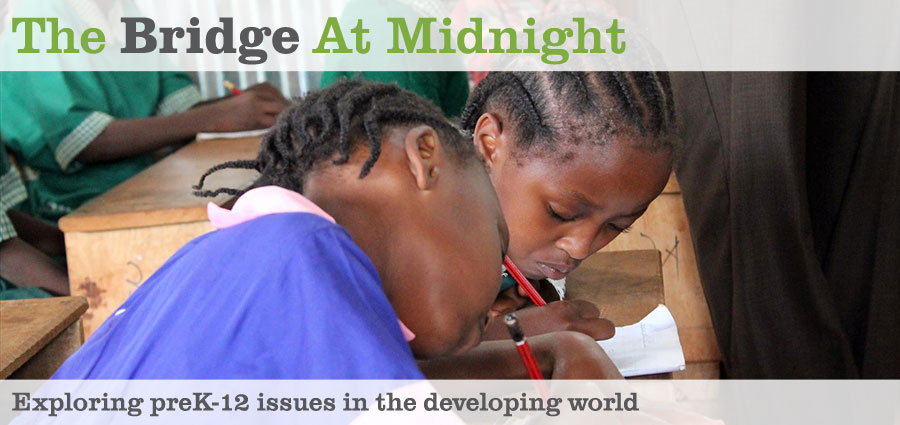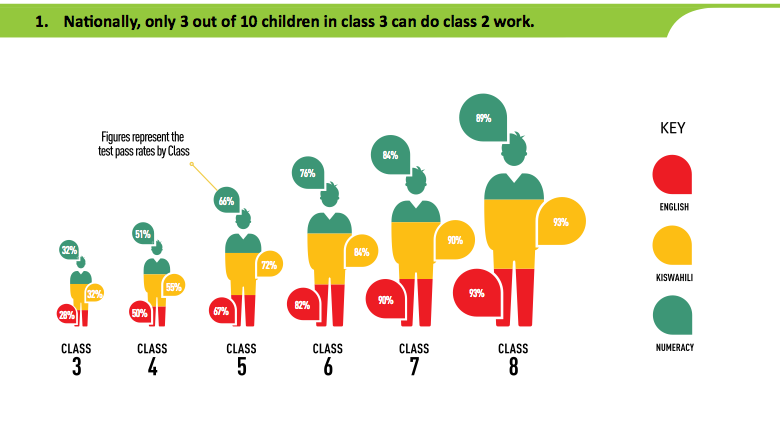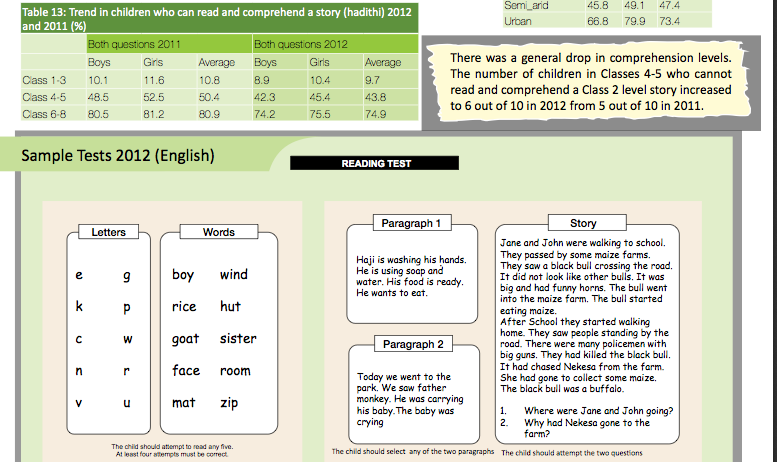Advice From The Kids
Posted: July 29th, 2013 | Author: Michael Goldstein | | No Comments »
Uwezo is a non-profit education advocacy group in Kenya. Good people. Last week they produced their annual report, and had a launch event.
The event opened a bit differently than such events in the USA. Starts with national anthem, than a homemade ballad about Uwezo (had a Bruno Marx like sound), then a prayer, and a poem. Later, there was a tea break. In the USA, we usually frontload the caffeine.
Someone quoted Benjamin Disraeli:
Upon the education of the people of this country the fate of the country depends.
About 200 attended. Lisa, Laura, Shannon, and I were among them.
The general thrust is: student achievement is low in Kenya. Kids aren’t learning much. Here you can see that less than half of Kenyan 4th and 5th graders can comprehend a simple story.
What should be done about it?
At the moment, there are 3 policies in play.
1. A massive laptop initiative, where 1st graders will get to use them.
2. A teacher strike and questions about teacher pay.
3. And a big shift of power from the federal level to the “governors.” It reminds me of “mayoral control” in the USA, where big city mayors in Boston, New York, Chicago, etc…for the first time had control over their public schools. Kenyan governors have been handed some power in past months. But nobody seems quite clear on what to do with it.
There were various expert panels and comments. But as always, and I say this as someone who sometimes be on such panels, the children who speak tend to be the most interesting.
Anton, a 6th grader, suggested
1. “There should be more consultations with teachers, parents, and pupils.”
2. “When pupils are courageous enough to ask teachers what they don’t understand, this would help.”
(Kenyan children ask very few questions in school. In the USA, teachers tend to love questions….so long as they’re reasonable and on point).
3. “Teachers should be caring, motivating, and supportive. When a teacher is careless, it is demotivating.”
Sheila said:
1. Imagine a poor boy at home. No electricity, no clothes. When he gets to class, he thinks what will I eat, what will I wear. He is very upset in class. We need to meet basic needs.
2. Sometimes the class is very dirty, pupils are not listening to the teacher, not concentrating. And the teacher says “As long as I get my salary, I don’t care.”
3. Child labor is bad. We have small children at construction site. This child goes to get money for his family. He or she will be very tired at school, too tired to even sit and listen.
Patricia said:
1. Some visually impaired parents can’t get their kids to school.
2. Some people take advantage of visually impaired children, involve them in abuse.
3. We need electricity in schools to listen to to audiobooks.
Patricia is blind. She read her points in Braille. I thought it took remarkable courage to stand before such a large group of adults, and not be able to see the nodding and encouragement. I teared up and pretended I had an allergy. She said a lot of other stuff too. Man, was she comfortable up there! Finally, after a couple of friendly-looking “speed it up” whispers from her principal, she finished up.
Big props to the principal, btw. I think he had to find the kids at home, since the schools had been shut due to the strike.
Nuggets from the report:
1. Uwezo data shows a big dropoff in class size in Class 8. From average class size of 67 in Class 7/6/5/4 etc to “just” 49 in Class 8.
We’ve heard many anecdotal reports that low performing students are asked to leave in Class 8. It’s hard to verify, but this 30% drop would fit that narrative.
2. Nairobi outperforms the country on many measures: 75% proficiency versus 55% for example. So our team needs to expect lower levels in the Bridge academies outside Nairobi.
3. Library at 34% of schools; feeding offered at 47%; sanitary towels for girls at 36%; clean water at 64%.
4. Boys lag behind girls in the early grades, according to Uwezo data, but outpace girls in the higher grades. In the USA, girls typically beat boys in most K-12 areas.
You can read the whole Uwezo report here.




Leave a Reply